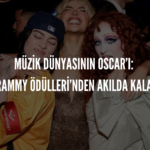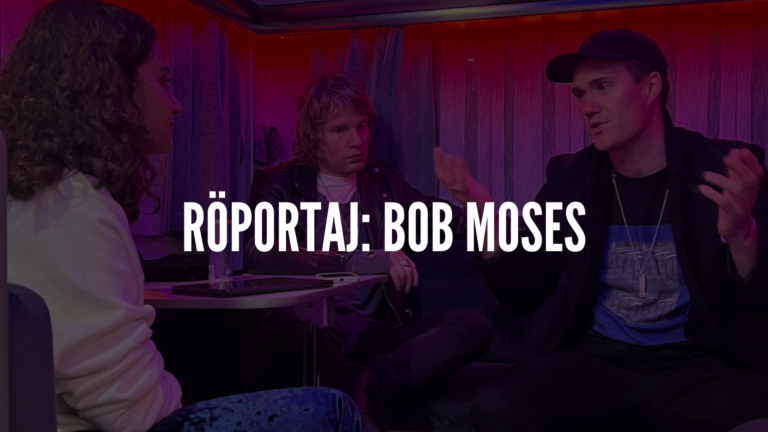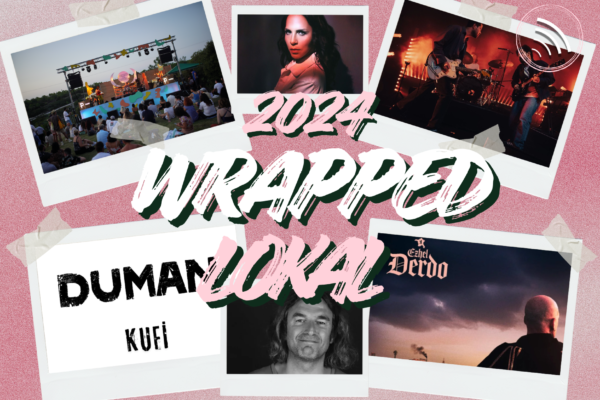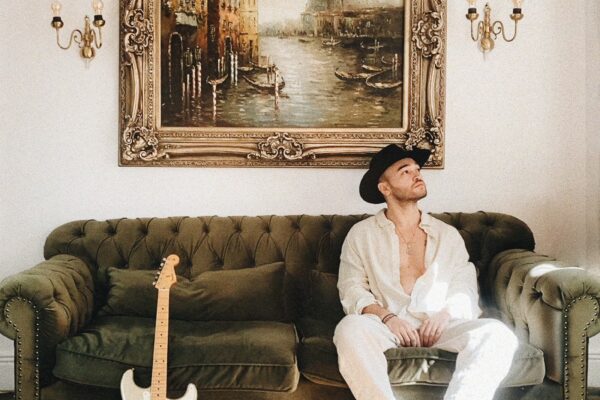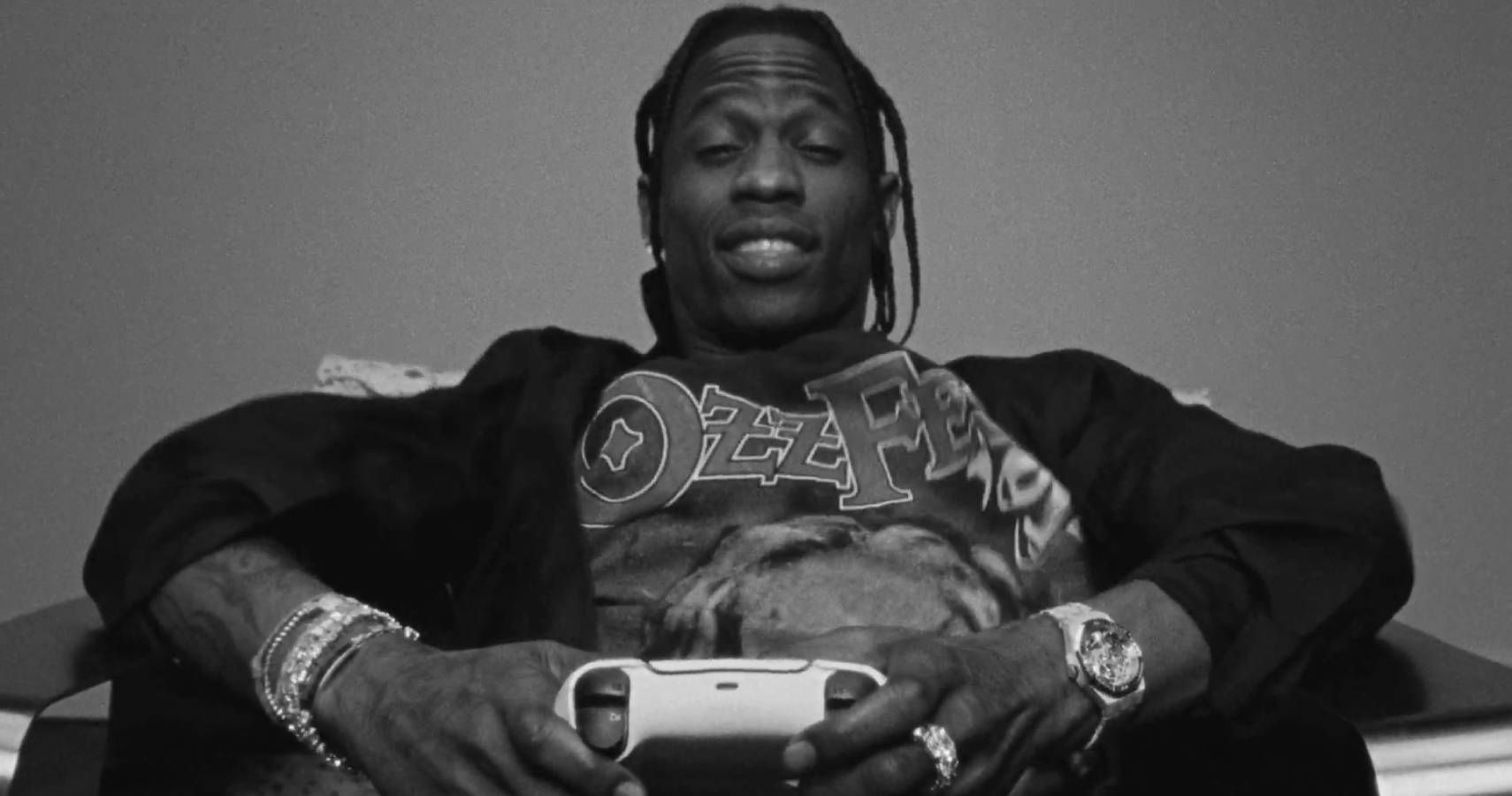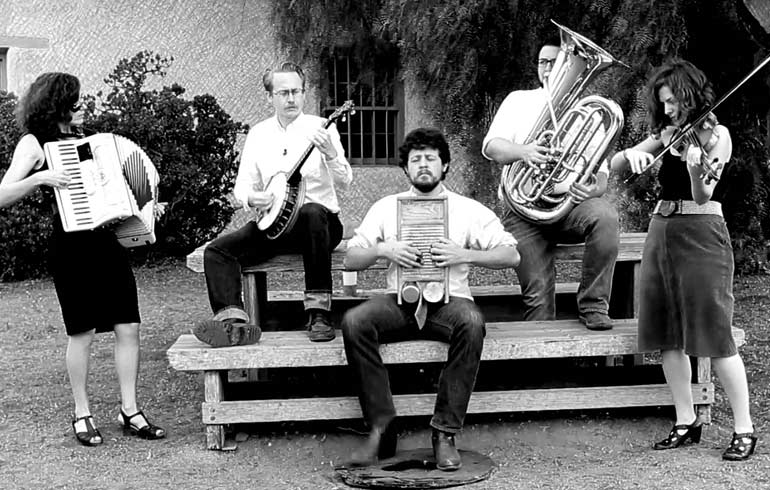Elektronik müziğin sofistike ismi Bob Moses ile röportaj gerçekleştirdik. Keyifli okumalar!
So, whenever you’re ready, we can start. Welcome to Turkey. How was your trip from Ankara to here?
Jimmy: It was fine. You know, like, we heard that the flights were getting canceled, so we just decided to get ahead of it and get in the car and drive. Stopped on the way, grabbed some food, and it was good, you know? Now we’re here. We made it.
It’s a cool day to have an outside festival right now(!)
Tom: Thankfully they have a very big tent.
Yeah, that’s great. They’ve just toled me that the tent can fly off too, but I believe that the guys are ready for that, too.
Jimmy: Yeah, we can just hold it down, you know. With our music.
Plan A is to go with the music and with the dancing people. So, I did my research so I’m not going to ask, “why are you named as Bob Moses?” Because you’ve answered multiple times but I know that you came from different musical backgrounds, like, for example, Tom, you were in a punk band before, and Jimmy, you were into trance music. When you put up your work together, your music blends electronic and live elements along with indie elements. So like, can you take us through your creative process behind achieving this fusion and how it has evolved from your first single to your last single and your performances?
Jimmy: Great question. I think when we started – we both really wanted to. I mean, when we were in high school, we both played in rock bands. So we both understood that world, and we really loved the sounds of electronic music and how certain kinds of electronic music and underground dance music at the time were pushing the boundaries and sort of sonics in the studio. We wanted to combine a project that worked for that. And I think that our sound was very much born out of the warehouse scene in Brooklyn because we basically wanted to figure out how to make music that we could play at the parties we were going to.
What kind of parties?
Jimmy: Like illegal warehouse raves, where we’d have to pay off the cops. It was small, just a few hundred people, but we felt it was a cool scene and wanted to be part of it. We started making various music, collaborating with artists like Frank and Tony, who already had a foothold in the scene. Our sound was born from that collaboration. Over the years, we’ve brought our influences, including rock, Britpop, and grunge, into the electronic music scene, exploring its boundaries as it evolved. It’s a fun, creative journey, albeit challenging and narrow, but incorporating our natural taste of blues and rock music has kept it authentic.
I’ve seen that you actually won a Grammy Award years ago. So I’m curious, what happens when you win a Grammy Award for your career, your popularity, and the way you do your music?
Jimmy: You get a call from your grandma saying they take your job seriously, you know? It’s weird; you don’t make music for awards. It’s a bonus. Growing up with dreams and aspirations, when you achieve them, it’s surreal. It happens, and the next day you’re like, okay, I still have to make music. It never feels like an arrival. If you told Tom and Jimmy ten years ago where you’d be now, it’d be like, Holy shit, really? But it still feels like the reason we do it is to make the best music we think doesn’t exist yet. That feeling never goes away. Big acts still play, driven to create. It legitimizes you; you feel honored your peers recognized you. But other than that, it doesn’t change much. You still wake up and do what you love.
Going back to normal world, like getting hungry and then just being hangover.
Jimmy: It doesn’t make the hangovers any better, let’s say.
Yeah, only maybe fancier for a day or so.
Jimmy: Yeah.
As I engage with your music videos and listen to your music, I sense a significant reflection of your personal lives in your work, showcasing a compelling storytelling aspect. I’m interested in understanding how your personal experiences influence the lyrical content of your music. Could you share more about your creative process? Do you follow a planned approach, or do you generally go with the flow?
Tom: Go with the flow, for sure, but we always have to write about real stuff, you know? If you don’t believe in what you’re singing about, nobody will. So we always have to make things that we can relate to. You know, it might even be like there are songs where I started the lyric idea, and it was about something Jimmy was going through from my perspective. Or I’ll write something about, let’s say, something else that happened in the world. But when we’re finishing the lyrics or writing them, we always talk about what they mean and have to understand more intellectually what’s going on. That being said, a big part of the process of writing lyrics and music is stumbling around in the dark. You don’t really know what you’re doing as you’re doing it; you have to figure out what you’re writing about, you know? So, in that way, we go with the flow. But we do make everything personal. Writing music for us is cathartic; it’s our way of understanding the world. So there has to be some personal relation to it, or else it doesn’t feel real.
How do you navigate your roles or responsibilities when producing and also performing? Like do you have specific roles or responsibilities while doing the music?
Jimmy: In the studio, I’d say one of the good things is that we can both do everything. Like, I can’t sing, so Tom’s always singing, but we always generate ideas together, sometimes apart. Then we come together. So in the studio, the best thing is having no rules because you never know when creativity, where a good idea is going to come from. In our personalities and musically, we’re lucky to be kind of like yin and yang. Tom excels in areas where I’m weakest, and vice versa. We overlap well, never get into disagreements. We both see Bob Moses as the filter of the two of us. Whatever gets through that filter, if we both like it, we know it defines Bob Moses. There have been times stuck on a line in a lyric where maybe I love it and Tom doesn’t, or vice versa. At the end of the day, we always agree. With space and time, we’ll go, “Oh no, actually Tom’s right,” or “No, actually Jimmy’s right about that.” It’s like we’re very diplomatic, and nothing feels like a compromise; it feels like collaboration in the best way. I think we’re very lucky to have that because I think a lot of people don’t, you know?
I think you guys sound like a perfect musical buddies together. Do you guys send each other playlists or songs when you feel down or up? And do you have any guilty pleasures while listening to music?
Jimmy: Oh, we both do. I mean, we love every kind of music. So, like, it’s hard to define what’s a guilty pleasure because, for example, the other day I was listening Britney Spears songs and – she just slaps, you know, it’s good. I don’t know, we love everything. If it’s good, we like it.
Tom: Yeah. Like I really like the new Taylor Swift song.
Jimmy: It’s just awesome. You know, she’s the biggest pop star in the world, but she writes fucking great song,yeah.
Same here, I think she has a great music strategy, being a businesswoman and all. When it comes to collaborating with other artists, how do you initiate it? Do you plan, or do they approach you? How do you believe collaborating with multiple artists can impact electronic music now?
Tom: The two main ways we collaborate are by sending ideas to someone who chooses and works on them. For instance, with “Inner Light,” due to covid, we couldn’t meet, so we sent ideas to Alex, and he chose one to work on. We exchanged it back and forth, and recently, we had studio sessions in LA where we got together with people and started creating. Both methods produce good results, and we find it fun to work with others. We’ll do anything for good results. Collaborating pulls us outside our box, and even if the outcome isn’t perfect, there’s always something to learn, whether it’s the way they approach drums or their writing style. Collaboration is something I’m a fan of; it’s the best way to create cool new stuff. It’s awesome.
And, you know, with the rise of various streaming platforms in the music industry now, like, and I think, with the ascent of digital streaming platforms, as mentioned earlier, I believe the way music is consumed has changed significantly too. Post-pandemic, with the surge of platforms like TikTok and Spotify’s new initiatives, etc. How has this influenced your approach to releasing and promoting your music?
Jimmy: I realize that with new technologies and trends, no one really knows what they’re doing. As an artist, you want your music to get maximum exposure amid the sea of releases. After creating a song, the next job is to ensure it reaches your fans and a wider audience. Stick to your gut about what’s best for your music and creative vision, avoiding compromising art for technology that constantly changes. Spotify’s highest streaming content includes old music, indicating lasting art over chasing trends. While platforms like TikTok are beneficial, editing yourself to fit technology may not be the best move. It’s a great tool, but caution is needed in how you deal with it.
Yeah, I think balance is the key word for that, I guess. Yeah. And right now, like just because internet is everywhere and people are able to just promote their music online. I think that has changed electronic music scene a lot. So, um, with the new sounds and the old sounds like, how do you keep yourself from preventing, like predictable patterns and like creating and involving something new to your music while having that Bob Moses signature?
Tom: Avoid thinking too much about it; go with the feeling. Stay true to what inspires us musically, and playing shows helps maintain that connection with the communal aspect of electronic music. The live experience enhances the magic that might seem mundane on headphones. In the studio, subconsciously, we strive for that connection. Beyond that, focus on doing what excites you and don’t overthink it. At this point, the Bob Moses signature comes out naturally, and we’ve ensured diversity in our records, widening the spectrum of possibilities. For example, in our first EP, we included an acoustic version to convey that we’re not limited to club tracks. So, yeah, that’s it.
And should we expect something from you in the near future?
Jimmy: Yeah, I mean, we’re always working on the next thing, you know? We’re not stopping anytime soon. We probably have a new one that we’ve been working on that we might even play tonight. So, for us, when we’re not touring or sleeping, not eating, and have time, we’re making music. It’s what we love to do, and there will always be something in the works, whether it’s an album, a single, or an EP.
All right, that’s good to hear. When I watch your music videos, they often align with your song’s mood. Similarly, in your live performance videos, I notice that your visual side is as important and strong as your music. How do you contribute to your visual design, both on stage and in your minimalist artworks and photoshoots? Do you scroll through Pinterest, or do you simply express what you want?
Tom: Before every new chapter, whether it’s a new album, EP, or single, we compile a list of images and other albums we like. We’re always watching and noting down cool things we see. When it’s time to create the next project, we share our vision with our manager, cool design people, video directors, and artists we want to collaborate with. It’s another collaboration, similar to making music. We share our perspective, and they give us something back. It’s a back-and-forth process until we reach something we’re happy with.
And what are your opinions on your styling. Like how do you just put up your clothes together?
Jimmy: We just go: “I don’t know, that shirt is dirty, I better not wear it.” We love rock and roll, coming from that world, but also embrace dance music, fashion, and art. Experiencing various forms of art influences our own. The filter I mentioned earlier involves taking in diverse influences, processing them, and creating something new. Whether it’s the clothes we like, films we watch, or concerts we attend, we absorb it all and channel it through our filter. This is ultimately who we are as individuals.
Tom: I think you just go with how you feel. So however you feel, looks cool or exciting. That’s what you have to follow.
Jimmy: I very much see buying a piece of clothing or deciding what to wear on the same level as choosing a record we’ll play. It’s something I feel attached to and that represents who I am. When DJing, it’s like inviting friends to your house and saying, “Check out this cool new track.” The difference is you’re doing it for a room of 5000 people or whatever the number may be. Everything becomes an extension of yourself.
Yeah, I think that’s a nice answer. I have some this or that questions for you. Just those like two options you pick one.
Jimmy: Dessert questions. Is that what you said?
This or that questions.
Jimmy: I like dessert questions. I was like “oh we got a choice of chocolate”.
So, vinyl or digital?
Jimmy: Um I’m going to go digital. Vinyl is a pain in the ass. It sounds great, but they’re heavy you know.
Tom: Digital all the way.
Studio sessions or live sessions?
Tom: I can’t answer that.
Jimmy: You can’t. You have to have that and this.
Tom: That and this. Yeah.
Indoor venue or outdoor festivals?
Tom: I think I mean I love both, but if I have to choose and it’s outdoor and it’s beautiful, I’d say I outdoor.
Jimmy: The sound is always better outdoors.
Tom: Sounds better outdoors usually. And also like inside, you’re only ever going to get inside. But outside you can have all the things of inside but also a beautiful. Yeah. So outdoor.
Sunrise gigs or sunset gigs?
Jimmy: They’re almost the same looking thing. You feel very different playing them though. They’re both great for different reasons.
Tom: I’d say sunset. Yeah. I don’t know. Good sunrise, I don’t know it’s hard.
And lastly, um, global touring or intimate residency?
Tom: Global tour. We are going to come back to Turkey every year. Yeah. We love it.
Jimmy: Global touring definitely yeah.
Actually, my questions are over. Thanks for the answers guys, it’s was a pleasure talking to you!
Jimmy: Good questions, thank you.
Tom: Thank you! See you soon.

